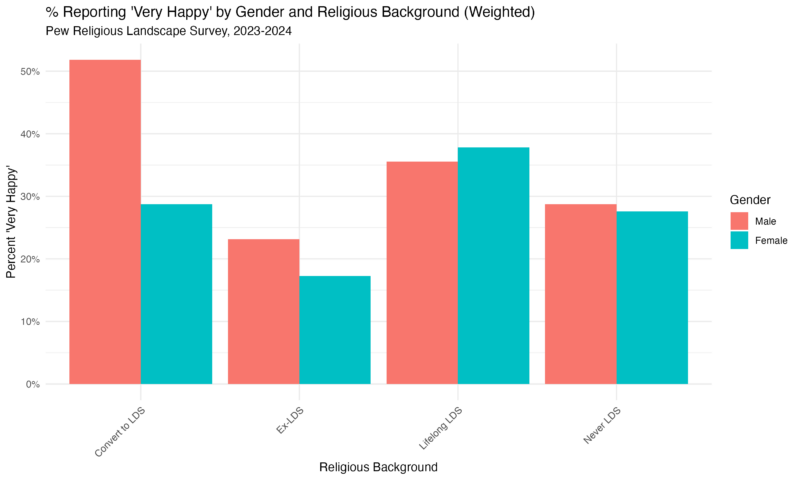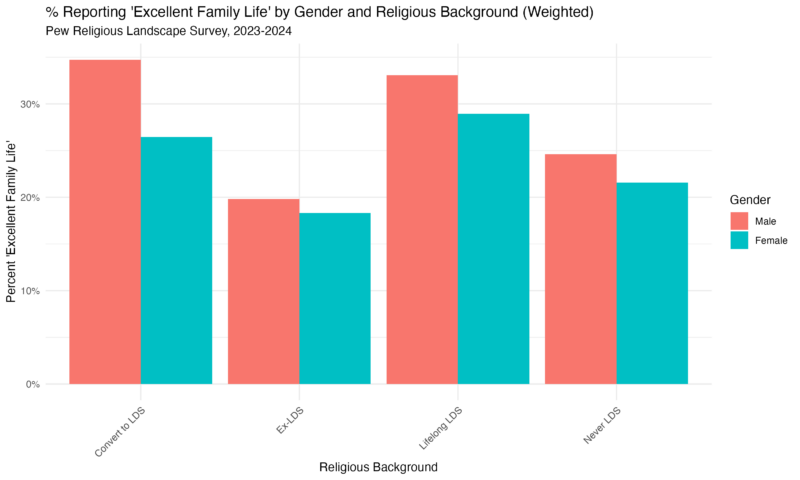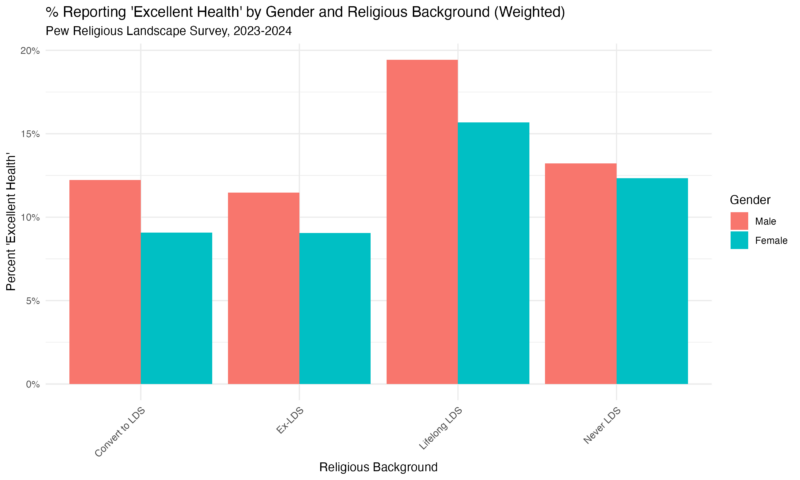The 2023-2024 PRLS had the rare combination of questions about 1) current religion, 2) religion in which raised, and 3) different measures of flourishing. This allows us to see whether, for example, former Latter-day Saints (at least those raised LDS who no longer identify as such) are happier than current Latter-day Saints, or current Latter-day Saints are happier than never Latter-day Saints, etc. There are 3 flourishing measures:
“Generally, how happy are you with your life these days?” [Very happy, pretty happy, not too happy]
“Would you say your health in general is excellent, very good, good, fair or poor”
“Would you say your family life is excellent, very good, good, fair or poor?”
I dichotomized each of these measures to report on the number who indicated that they were the highest level, so “very happy,” “excellent health,” and “excellent family life.”
The PRLS is large enough that we have 147 converts, 313 former members, 414 lifelong members, and 35,382 never members.



So in terms of rank ordering lifelong Latter-day Saints and converts are the happiest (although women are at about the same level as never-members), followed by never Latter-day Saints, and then former Latter-day Saints. This is the same pattern for having an “excellent” family life, but for health converts are at about the same level as former Latter-day Saints.
Specifically, while about 30-40% of lifelong Latter-day Saints and converts are “very happy,” (male converts are an outlier), for never Latter-day Saints it’s in the high 20s, and for former Latter-day Saints it’s in the mid-teens to low-20s.
For excellent family life converts and lifelong members report 25-35% , with never Latter-day Saints in the low 20s, and former members in the high teens.
15-20% of lifelong members report excellent health versus about 12-13% for never members and about 10% for converts and former members.
Wonk Start
Of course, some of these groups are rather small (which is perhaps one reason why there is a big convert gender gap–statistical bumpiness), so there is the question of statistical significance. I ran a series of weighted regressions to test for difference using the lifelong members as the omitted reference group.
- Ex-members and never Latter-day Saints are significantly less happy than lifelong members, for converts it’s a statistical tie with lifelong members.
- For self-reported health there are no statistically significant differences between lifelong members and any group. However, for former members it barely misses the cutoff for significance (p=.078).
- Ex-members and never Latter-day Saints report significantly poorer family lives than lifelong members, for converts it’s a statistical tie with lifelong members.
See code here.

Comments
10 responses to “Are Latter-day Saints Happier? The Pew Religious Landscape Survey, Relationship with the Church, and Flourishing”
As a late adult convert, these numbers correspond well to the percentage of Latter Day Saints that appear to me to have truly received the baptism of fire and the Holy Ghost, the endowment of God’s power. Receiving it, beyond being given it, is, to me, the only way to truly be happy.
Interesting life long LDS women are slightly happier than men. Would be interesting to see the data and control for race, SES.
I found this sentence interesting:
“The PRLS is large enough that we have 147 converts, 313 former members, 414 lifelong members, and 35,382 never members.”
I was surprised that there were 3/4 as many reported “former” members as “lifelong” members. Most of these former members have not likely removed their names from our rolls. It shed some light on our church’s claim of over 17 million members. This suggests that a truer membership claim is possibly around half of the 17 million.
I wonder if the average former member would say that the relative unhappiness is because they aren’t in the church or if they are unhappy because having been the church made them that way. Causal relationships are always tricky from these sorts of data sets.
Does not surprise me one bit. In my time before returning to the church I was quite unhappy, and I have seen a similar pattern with friends who have also come back after a period of inactivity. This is entirely anecdotal and not scientific at all, of course.
This is not a measure of how people are, but how they *think* they are. Self report on surveys like this are suspect, because it is a completely subjective measure. If people have been told all their life that they are happier because they have the Truth, then they are going to say they are happier than someone who has not been indoctrinated the same way. They will report that they are happier than other people even if they are on antidepressants. Personally, I am much happier as an exLDS than I ever was when I was trying to fit my round peg into a very square hole. I couldn’t make it work. If people believe that keeping the WoW makes them healthier, they will report that they are healthier, no matter that their doctor might disagree with them. If someone leaves the church and it tears their family apart, does that really mean that those who stay in the church have better families, neglecting that it was the church that damaged relationships, or does it only mean you have to leave the church to see how weak your family really is. Self reports are just reports of what people think they do and feel, not reports of what they actually do and feel.
So, Mormons *think* they are happier, healthier, and have better families than anybody else. Is that the objective truth, or are Mormons just convincing themselves they are better than anyone else? If it was objective truth, there would be measurable differences in number of divorces, people on anti depressants, suicides, and other objective measures. But the jello belt has more people on antidepressants, more suicides, and just as much divorce.
Satan is miserable and wants others to be miserable too.
Someone can be very happy in their marriage. Then they find out their spouse has lied to them about crucial information. The betrayal makes it impossible to stay married.
Previous to finding out about the betrayal, they were happier, but it was a fake happiness. After finding out about the betrayal, the person is less happy than before, but knows it is better to leave the relationship than to stay. Staying would be the least happy option.
A lot of ex Mormons are in the stage of feeling betrayed. Recovery isn’t easy.
Although I believe that faith in Jesus Christ brings peace, which increases happiness, the more analytical part of me wonders which direction the causal arrow points. Are Church members happy because of things associated with their membership, or are unhappy people more likely to leave the Church and then continue to be unhappy (because church and religion weren’t the cause of their unhappiness in the first place), leading to some self-sorting that’s correlated with happiness?
Anna pops up about the survey being subjective then spends the rest of her post giving her subjective musings. This is one data point that you use in reaching an overall assessment there are obvious limitations with the approach. Generally religiosity is a predictor for better life outcomes, study after study confirms this and the research in this area is focussed on the why as jks and dsc have wondered on. The statistis you cite can twist the same way, you could attribute the divorce and suicidal rates being higher to ex Mormons or non members, you could say anti depressants are linked to access to better health services as opposed to inherently higher depression rates. But that would be me talking out of my arse and I don’t need to because my self worth isn’t so fragile as to care what a survey says about my life.